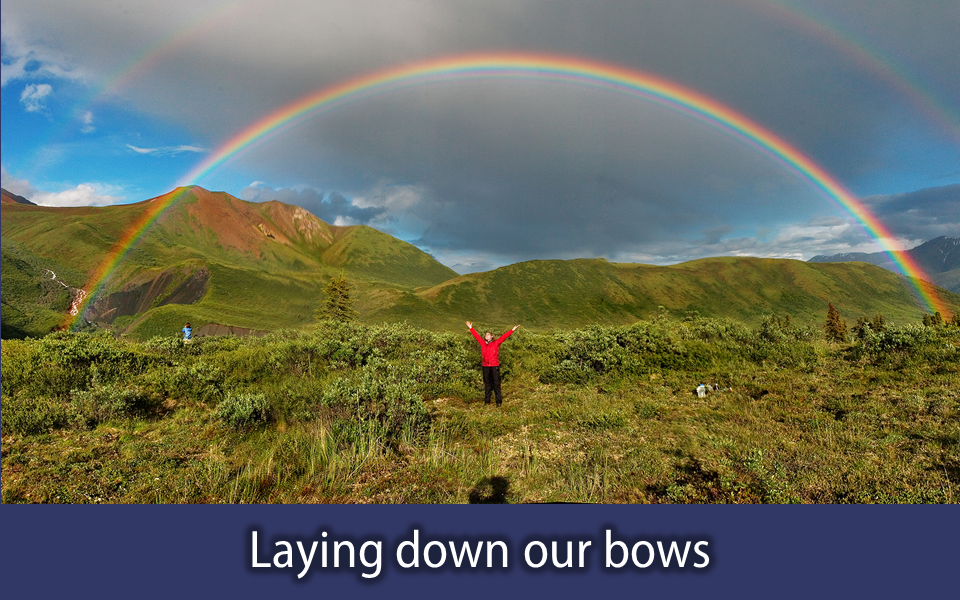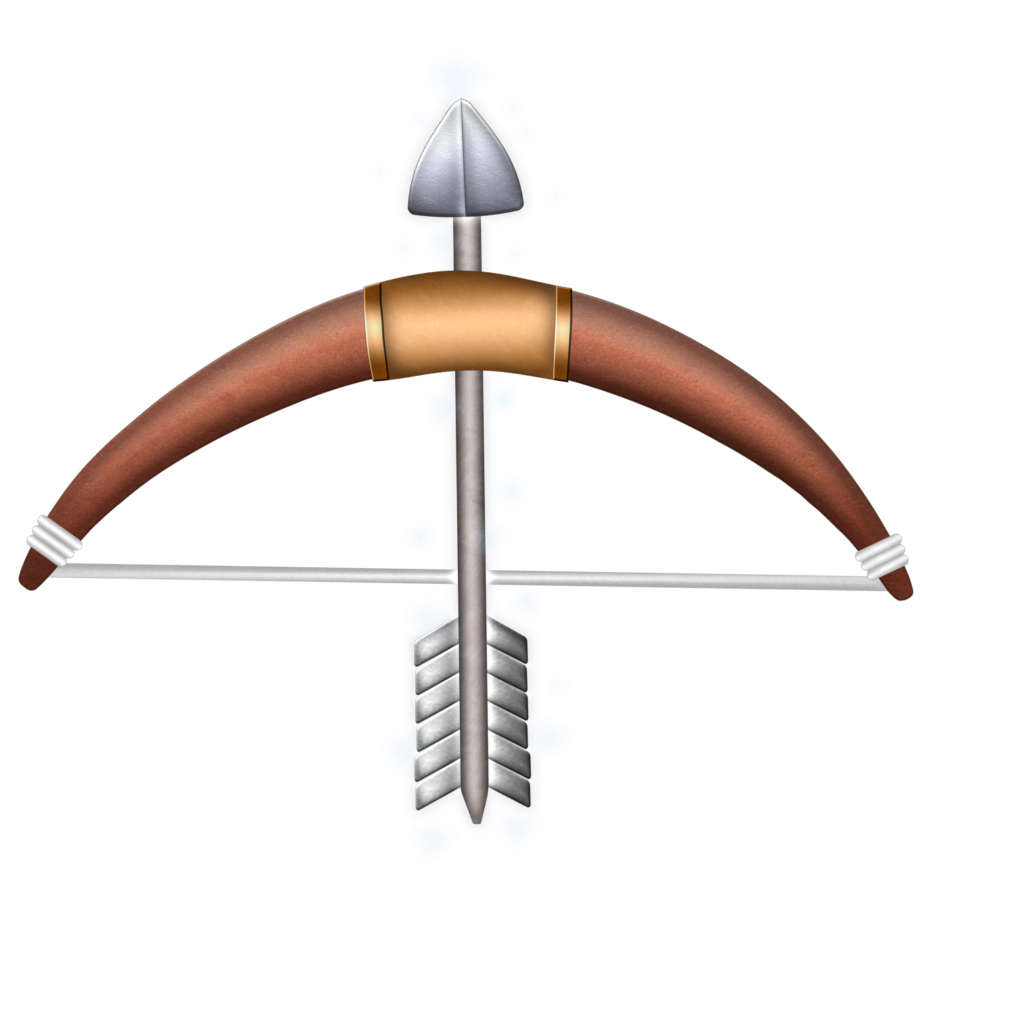Food Bank
Second Sunday in Lent
Daily Devotion for February 23, 2021
Join us for dinner at 6:00 pm
Worship, February 21, 10:00 am
Laying Down our Bows
Laying Down our Bows
Hespeler, 21 February 2021 © Scott McAndless – First Sunday in Lent
Genesis 8:20-22, 9:8-17, Psalm 25:1-10, 1 Peter 3:18-22, Mark 1:9-15 (Click to read)
Can God make a mistake? Can God be sorry for that mistake? Many people would suggest that it is blasphemous to even ask a question like that. Surely God is God and God cannot ever be wrong! But then how do you explain the whole story of the flood in the Book of Genesis?
The story begins like this: “The Lord saw that the wickedness of humankind was great in the earth, and that every inclination of the thoughts of their hearts was only evil continually. And the Lord was sorry that he had made humankind on the earth, and it grieved him to his heart. So the Lord said, ‘I will blot out from the earth the human beings I have created—people together with animals and creeping things and birds of the air, for I am sorry that I have made them.’”
In any simple and straightforward reading of that text you cannot see anything but an admission of a mistake. God regrets creating humankind. God seems to regret it in particular because of the inherent violence of the human race. Ever since Cain and Abel, it seems that the people cannot stop attacking and killing each other. And so, God comes up with a plan. God decides that the only way to counter murder and violence is with, well, murder and violence. God decides to wipe out the whole lot of them.
And then, in our reading this morning, we meet the same God on the other side of the whole flood narrative. And here, the sense of regret seems even deeper as the Lord speaks to God’s own heart and says, “I will never again curse the ground because of humankind, for the inclination of the human heart is evil from youth; nor will I ever again destroy every living creature as I have done.” Now listen closely to that. Not only is God regretting the act of destruction that God has committed, God also seems to be admitting that it didn’t even accomplish anything. The human heart is just as evil as it ever was. The flood accomplished nothing.
Did God make a mistake?
That is the plain meaning of the text – God made a mistake and regretted it and so vowed to behave differently from now on. And, of course, ever since that story was first told, people have struggled with it and tried to explain away God’s apparent mistake. People have rightly pointed out that our minds can hardly comprehend the mind and the motivations of God. Who are we, after all, to accuse God of making a mistake when we barely even understand why we behave like we do sometimes?

So yes, we should approach God with all humility and not pretend to understand all that is in God’s mind. But, at the same time, there is no question that God shows some real remorse over what has happened and is so convinced of the need to take a new course of action that God sets a permanent reminder in the form of a rainbow in the heavens so that neither God nor anyone else can ever forget.
What if the Story Is About Us?
So, what do we do with this story? I have a thought. What if this story is not really about whether or not God can make mistakes? What if it is actually about something else – what if is it actually about us. Yes, we may never understand the thoughts of God’s heart, but we know the thoughts of our own. And I can’t help but notice that there is something familiar about how God behaves in this story – something very human. And I think it may be intentional.
God sees a problem and that problem is mounting violence. And God concludes that only one thing can fix such a problem. The only way to counter violence is with more violence. That is what we usually think too, isn’t it? The only way to stop a bad person with a gun is a good person with a gun. Ever heard that one? The only remedy to violent crime, some would say, is the death penalty. And, of course, the only way to solve a problem in a violent Hollywood movie is for Keanu Reeves or Tom Cruise to run in with guns blazing. Fixing violence with more violence seems to be our go-to strategy no matter what happens.
Well, that is the approach that God takes as well in the flood story. God chooses to simply wipe out all the violent offenders at once. But, as we see in our reading this morning, when it is all over with and everything is finally dried up, God realizes that his approach did not work. All kinds of people have died, but the basic problem still remains as God recognizes that “the inclination of the human heart is evil from youth.”
But what do we do in that kind of situation? When we recognize that the solution we have tried to follow to solve our problems hasn’t worked, what do we do? Often all we do is double down. We conclude that the problem is not that we tried to counter violence with more violence, but that maybe we just weren’t violent enough. We humans, generally speaking, are just not very good at recognizing that our strategies for dealing with problems are bad.
God Shows Us A Better Way
But God, in this story, shows us a different way. And he shows it to us with a very concrete symbol. God says this to Noah, “This is the sign of the covenant that I make between me and you and every living creature that is with you, for all future generations: I have set my bow in the clouds, and it shall be a sign of the covenant between me and the earth.”

The reference here is pretty obviously to the appearance of a rainbow that can often appear in the sky in the aftermath of a large storm. But do take note that the word that is used actually refers to a literal bow, that is to say the kind of bow that is used to fire arrows. The image here is of a warrior, God, who decides to lay down a weapon of war and not use it anymore. The rainbow is a visual symbol that that is what God has decided to do. Every time it appears it is meant to remind both God and humanity of this rejected method of dealing with problems.
And I honestly do not know what that is meant to tell us about whether or not God can make mistakes, but I suspect that it is meant to teach us something about how we ought to respond to the mistakes that we make.
As I said, we have a tendency, when the strategies we have used to solve problems do not work, to double down and just try to do them harder. This is a particular human folly, but we all do it. And I’m wondering if maybe this whole story of God and the flood is there to teach us to give up on that very folly. Every time we see the rainbow, we should remember that God gave up on a failed strategy and, if God can do that, we should think, maybe we can do it too.
Various Ways of Dealing with Problems
We all have ways of dealing with our problems. There are some people, of course, who always do try to solve their problems with violence. But that is not everybody.
Let me give you an example from my own experience. When I find myself in a situation where there is some conflict, my immediate instinct is not, like that of some people, to want to fight. I personally have a deep dislike for conflict, and so what I tend to do is I try to avoid it at all costs. If I’m in a disagreement with someone, I often want to do just about anything to resolve it quickly and that includes giving up and saying that I’m wrong, even if I actually believe I’m right. Other times, I will just do whatever I can to just simply escape the situation.
This is just how I have always tended to deal with conflict. Now, does this strategy always work? Not really. Yes, it might sometimes make things feel more peaceful in the short term, but it is not really a very good strategy for dealing with conflict over the long term and can often make it worse over time. But this is the way that I, because of my background, because of the psychological tendencies that I have, would naturally deal with any conflict or problem.
I believe that, if I want to take the example given in the story of the flood seriously, what I ought to do is that I ought to put down my bow. I need to learn to stop relying on this natural method I have for dealing with conflict because it doesn’t really work. Indeed, I have already done a lot of this work in my life and developed other ways of responding.
But I recognize that we are not all alike. There are indeed some people who try to solve all of their problems with violence and brute strength. There are some, like me, who have developed passive aggressive strategies for avoiding conflict. There are others, and I have known a few, who’s automatic response whenever they face a difficult situation, is for them to take all of the burdens of everybody else in the situation on to their own backs, often neglecting their own needs in the process. There are others who just give up or run away. We are all different.
But the problem is that once we develop these kinds of responses to stress and trouble, we tend to lock ourselves in. And a lot of the time, these strategies just do not work and that is where we run into a lot of trouble.
The amazing thing about God in the story of the flood is that, when God discovers that the strategy doesn’t work, God lays down the bow. God vows not to use that strategy anymore. And what I’m wondering today is whether that might not be there, not to teach us something about God and God’s failures, but rather to teach us to be willing to do the same kind of thing when our strategies fail.
We Lay Down Our Bows

And so, we are going to end today’s sermon with a bit of a spiritual exercise. I know that many of you have made or drawn a rainbow for this morning’s service. I want you to take that rainbow now or, if you don’t have one (which is fine), I want you to imagine that you’re holding a bow in your hand. This bow represents your weapon. It represents how you respond in the face of a stressful, conflicted or dangerous situation.
So, close your eyes, and just imagine yourself in that kind of situation. Say that you’re in the middle of a room and people are yelling at each other because everyone’s upset and maybe they’re especially upset at you. Just imagine yourself in that situation for a moment. Are you there? Now, ask yourself, what is your instinctual response to that situation.
I’m not asking what you may have learned to do. I’m just asking what is your gut level response. Are you tempted to strike back? Do you want to play the victim? Do you want to withdraw? Do you want to fix everybody else? Do you want to play the peacemaker at the expense of yourself?
That instinctual response is your bow, your weapon. That is how you have learned to respond in that kind of situation. Has it always worked for you? Maybe sometimes, but I’ll bet that often enough it causes some serious problems.
So here’s your what I want you to do. I want you to lay down your bow. I want you to consciously decide to set aside that instinctual response to stress and ask God to empower you to make different and better responses. If you’ve been literally holding a bow, lay it down. If you’ve just been imagining one, make that motion. That’s what God did at the end of the flood, and I suspect that God did it to teach you and me that there is another way.
And, of course, the wonderful thing about the rainbow in the flood story is that it’s a continual reminder. Every time the dark clouds gather, and the winds blow and all does not seem right in the world, the rainbow appears in the clouds as a reminder that there might just be a better way to deal with our problems.
And so, if you have laid down your bow, I invite you to place that bow in a place where you are going to see it this week and throughout this season of Lent. Let it be that reminder to you of your decision to trust in God that there are better ways of dealing with your problems and with the stresses of life than the dysfunctional ones that we have developed out of our personal fears. Let it be a continual reminder of God’s promise to do the same and help to renew you during this season of Lent.
A Final Prayer
Heavenly Father, we are just a bunch of people who sometimes get things wrong. And when people are upset or they’re stressed or the world seems upside down, we don’t always respond in the best ways. Some of the weapons that we carry around with us are dysfunctional and can even make things much worse. But here we follow the example left by us in the scriptures, and we lay down our bows. We dedicate ourselves to find other ways, better ways, to deal with the difficult moments of life because we are committed to be loving and giving people. Amen.